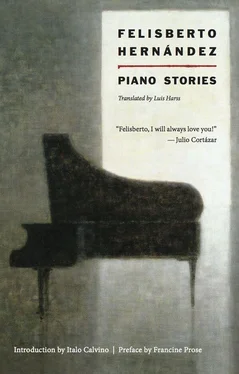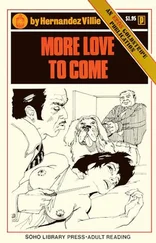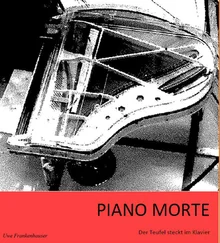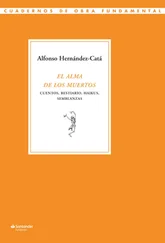Felisberto Hernandez - Piano Stories
Здесь есть возможность читать онлайн «Felisberto Hernandez - Piano Stories» весь текст электронной книги совершенно бесплатно (целиком полную версию без сокращений). В некоторых случаях можно слушать аудио, скачать через торрент в формате fb2 и присутствует краткое содержание. Год выпуска: 2014, Издательство: New Directions, Жанр: Современная проза, на английском языке. Описание произведения, (предисловие) а так же отзывы посетителей доступны на портале библиотеки ЛибКат.
- Название:Piano Stories
- Автор:
- Издательство:New Directions
- Жанр:
- Год:2014
- ISBN:нет данных
- Рейтинг книги:4 / 5. Голосов: 1
-
Избранное:Добавить в избранное
- Отзывы:
-
Ваша оценка:
- 80
- 1
- 2
- 3
- 4
- 5
Piano Stories: краткое содержание, описание и аннотация
Предлагаем к чтению аннотацию, описание, краткое содержание или предисловие (зависит от того, что написал сам автор книги «Piano Stories»). Если вы не нашли необходимую информацию о книге — напишите в комментариях, мы постараемся отыскать её.
Piano Stories
Piano Stories — читать онлайн бесплатно полную книгу (весь текст) целиком
Ниже представлен текст книги, разбитый по страницам. Система сохранения места последней прочитанной страницы, позволяет с удобством читать онлайн бесплатно книгу «Piano Stories», без необходимости каждый раз заново искать на чём Вы остановились. Поставьте закладку, и сможете в любой момент перейти на страницу, на которой закончили чтение.
Интервал:
Закладка:
No One Had Lit a Lamp
Once years ago I was reading a story in the parlor of an old house. A bit of sunlight had been filtering in through one of the shutters. Slowly it had enveloped the people in the room and spread to a table with pictures of dead “loved ones.” I was having trouble bringing out my voice, as if squeezing notes from an instrument with a broken bellows. In the front chairs sat two widows, the ladies of the house. They were very old but still had thick hair done up in buns. I was reading listlessly, often raising my eyes. I tried not to look at the same person each time, but my eyes kept returning to the pale area between the collar and the bun of one of the widows. It was a settled face absorbed in a single memory that would still be with her for some time. At moments her eyes seemed like smoked glasses with no one behind them. Every now and then I remembered there were important people in the audience, and I did my best to breathe life into the story. One of the times my attention wandered I looked through the shutters and saw a statue with pigeons scrambling over it. Then, in the back of the room, I saw a young woman lean her head against the wall. Her wavy mane was spread out wide and I ran my eyes over it as if it were a plant growing along the wall of an abandoned house. It was too much of an effort for me to remember what I’d been trying to get across in the story, but sometimes the words alone and the habit of reading them in a certain way had an automatic effect and provoked unexpected laughter. I had already run my eyes a second time through the hair of the woman backed against the wall, and I wondered whether she had noticed. To avoid being indiscrete I looked out at the statue. While I went on reading I thought of the innocence with which the statue played a role it could not understand. Possibly it felt closer to the pigeons than to the self-important character it portrayed: it did not seem to mind having them flutter around its head or land on the scroll it held against its side. Suddenly I realized I was staring again at the head of the woman backed against the wall and that she had just closed her eyes. I struggled to recover the excitement I’d felt the first times I’d read the story: it was about a woman who went out on a bridge every night hoping to commit suicide but always met with some obstacle. The audience laughed when someone propositioned her one night and she was so frightened that she ran all the way home.
The woman against the wall was laughing too, turning her head right and left as if it lay on a pillow. By now I’d taught myself to shift my eyes from her head to the statue. I tried to imagine the character it portrayed but could think of nothing serious enough: perhaps he also had stopped taking himself as seriously as he used to in life and spent his time now playing with the pigeons. I was surprised when people smiled at my words again. I looked at the widows and noticed someone peering out the sad eyes of the one that seemed to be wearing smoked glasses. Once when I tore my eyes off the woman backed against the wall I didn’t look out at the statue but into another room where I thought I saw flames on a table. Some eyes in the audience followed mine, but it was just a vase with red and yellow flowers that had caught a bit of sunlight.
When I finished reading, a busy crowd surrounded me with questions and comments. A weighty gentleman started to tell me a story about another woman who had committed suicide. He wanted to express himself properly but couldn’t find the right words and kept going into roundabouts and digressions. I noticed the audience was growing impatient: we all stood there not knowing what to do with our hands. The young woman with the wavy mane came up and joined us. I looked at her and then out at the statue. I didn’t want to hear the gentleman’s story because his clumsy hunt for words was painful to me: it was as if the statue had started slapping at the pigeons. But there was no way to get out from under the dull persistence with which he droned on, as if he were trying to say: “I’m a politician and can crank out a speech or a story to suit every occasion.”
Among the listeners was a young man with a strange mark on his forehead: a dark smudge that followed his receding hairline way back, like the shadow of a thick beard that has just been shaved and powdered. I looked at the woman with the wavy mane and to my surprise she was also staring — at my hair. Just then the politician finished his story and everyone clapped. I could not bring myself to congratulate him. One of the widows had already said: “Please sit down.” We all sat with a more or less general sigh of relief, but I had to get up again when one of the widows introduced me to the girl of the wavy mane, who turned out to be her niece. I was invited to sit in the center of a large sofa, between the niece and the young man with the smudge on his forehead. The niece was about to speak, but the young man raised a hand to silence her. Addressing me, with his fingers still pointed upward like the ribs of an umbrella bent in the wind, he said:
“I’ll bet you’re the sort of lonely character who’d only make friends with a tree.”
I wondered whether he had shaved his forehead to broaden his brow and, feeling mean, answered:
“Don’t you believe it. You can’t take a tree for a walk.”
The three of us laughed. He threw his shaved forehead back and said:
“How true — a tree is the friend who’s always where you left him.”
The widows were calling their niece. She rose with a grimace, and as she walked away I suddenly realized she was heavyset and violent. I turned to meet another young man who was being introduced to me by the one with the shaved forehead. He had just combed and left droplets of water on the tips of his hair. Once when I’d combed my hair that way as a child my grandmother had asked me, “Cow lick you?” The newcomer sat in the niece’s place and started to complain:
“Oh, that endless story! What an awful man! And so obstinate!”
“And you, my dear, so effeminate,” I felt like saying, but instead I asked:
“What’s his name?”
“You still talking about. .?”
“. . that obstinate man.”
“Oh, I forget. He’s from one of those old families. He’s a politician and he’s always on the juries of literary contests.”
I caught the eye of the young man with the smudge on his forehead, who shrugged as if to say: “Such is life!”
The niece was back, pulling the effeminate young man off the sofa. While she tugged at his arm, shaking him so hard that he stood up with drops of water on his jacket, she was saying:
“Well, I don’t agree with you. .”
“Why not?”
“. . and I’m surprised you’d think a tree can’t go for a walk with us.”
“But how could it?”
“By repeating itself in long steps.”
We praised her idea and she was encouraged:
“Repeating itself along an avenue, it shows us the way. Then all the trees of the avenue join heads to watch for us. And as we approach they open up to let us through.”
She made it all sound like a joke so it wouldn’t seem too romantic, blushing with pleasure and embarrassment.
The charm was broken by the effeminate young man:
“But at night in the woods the trees attack us from all sides. Some stagger and sway as if about to fall on us, and others trip us up or reach out and grab us with their branches.”
The niece could not help exclaiming:
“Why, if it isn’t Snow White!”
And while we laughed, she said she had been meaning to ask me a question, and we went into the next room, where I’d seen the vase with flowers. She leaned across the table toward me, with her hands deep in her hair, and said:
Читать дальшеИнтервал:
Закладка:
Похожие книги на «Piano Stories»
Представляем Вашему вниманию похожие книги на «Piano Stories» списком для выбора. Мы отобрали схожую по названию и смыслу литературу в надежде предоставить читателям больше вариантов отыскать новые, интересные, ещё непрочитанные произведения.
Обсуждение, отзывы о книге «Piano Stories» и просто собственные мнения читателей. Оставьте ваши комментарии, напишите, что Вы думаете о произведении, его смысле или главных героях. Укажите что конкретно понравилось, а что нет, и почему Вы так считаете.












